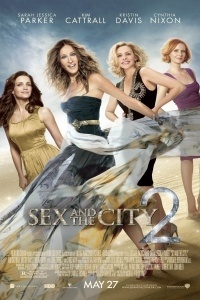
 In the new film Sex and the City 2, heroine Carrie Bradshaw suffers a crippling blow to her ego as she discovers her brand new book – a book about married life and wedding vows – is utterly destroyed by a review in the New Yorker. Distraught, she turns to her three best friends and over drinks it is decided that the reviewer, a man, simply cannot stand the thought of a powerful, liberated woman. Problem solved. No, really. That’s the last we hear of that subplot. It is actually the first of three subplots (out of five total) that are resolved this way in the new film. Men are sexist pigs that are the root of all of our problems. Drink up ladies!
In the new film Sex and the City 2, heroine Carrie Bradshaw suffers a crippling blow to her ego as she discovers her brand new book – a book about married life and wedding vows – is utterly destroyed by a review in the New Yorker. Distraught, she turns to her three best friends and over drinks it is decided that the reviewer, a man, simply cannot stand the thought of a powerful, liberated woman. Problem solved. No, really. That’s the last we hear of that subplot. It is actually the first of three subplots (out of five total) that are resolved this way in the new film. Men are sexist pigs that are the root of all of our problems. Drink up ladies!
Now, on the surface, I’m fine with this. While it’s a terribly unsatisfying way to wrap up a subplot (as well as ultimately serving nothing but reinforcing negative stereotypes), a movie can and will say what it wants. And it’s not like there aren’t actually sexists out there that are, in fact, threatened by powerful, liberated women. Sex and the City brings that ugliness out in droves, filling comment sections with 10-year-old South Park jokes about the age of the women and their appearance. But at the same time, the series (and others like it, like Twilight) also brings out an ugly spate of misandry, as male critics, like myself, are deluged with hate mail, comments and rampant, misdirected sexism stemming from negative reviews of female-tooled entertainment.
Forget, for a moment, that the language in said reviews is exactly the same as that used in reviews of such male-driven lowest common denominator fare as Transformers 2, Tomb Raider or 10,000 B.C., because these commenters often do, even falsely accusing us of defending such insipid fare in order to support and justify their own sexist viewpoints. Even if it wasn’t, how can one justify the sexism inherent in the responses? Here are the three most common I’ve encountered.
The Unqualified Qualifier — The most obviously sexist of the comments. I am often the recipient of e-mail telling me that since I am a man and this entertainment was made for women, I cannot possibly understand it and should not be reviewing it. Men won’t have a desire to see it any way, and a man’s viewpoint is not appreciated. Now imagine that I sent an e-mail telling a female reviewer that same thing, swapping only the words “men” and “women.” Let’s just say it probably wouldn’t end well for me.
The White Knight — This is the most insidious form of sexism as it is both presented as “enlightened criticism” and is usually done by someone who believes he has the best of intentions. I am of course talking about “the guy.” He’ll often point out that he’s straight or married or has a girlfriend and feels the need to defend the ladies from a clearly sexist attack. What he doesn’t realize is that the very act of thinking that “the ladies” can’t speak up for or defend themselves is actually, in and of itself, sexist. They can and they will. The worst form of the White Knight, however, is the one merely disguising himself as this guy, especially when he’s pointing it out to draw in hits and click-throughs, making his website seem more open-minded. You know, exactly like the guy who tells you your boyfriend doesn’t respect you in order to add you to his notch-in-the-headboard collection.
It’s for Girls, So It Deserves a Pass — This is the one that REALLY blows my mind. While it is rarely directly argued this way, the underlying critique is that as this is made for women and women like this stupid stuff, they should be allowed to have it. This opinion often comes from other critics who, despite seeing the inherent flaws in a film, feel that since the audience will like it any way, they will rate the film higher. This is insulting to the audience as a whole, assuming that they won’t know better. I’ve spoken to and exchanged e-mails with a number of women this week (both angry and positive about my critiques) and not one of them had any delusions about what this show or series is. Pretending or insisting otherwise is doing a disservice to the audience in question. Whether or not the audience chooses to forgive its flaws is the issue at hand – there is no need to conceal them.
I don’t know what it is about these films in particular that brings this out, but sexism is alive and well on both sides of the gene pool. And I don’t know if we’ll ever see an end to it. All critics can do is continue trying to treat every film the same, regardless of who it was made for.


